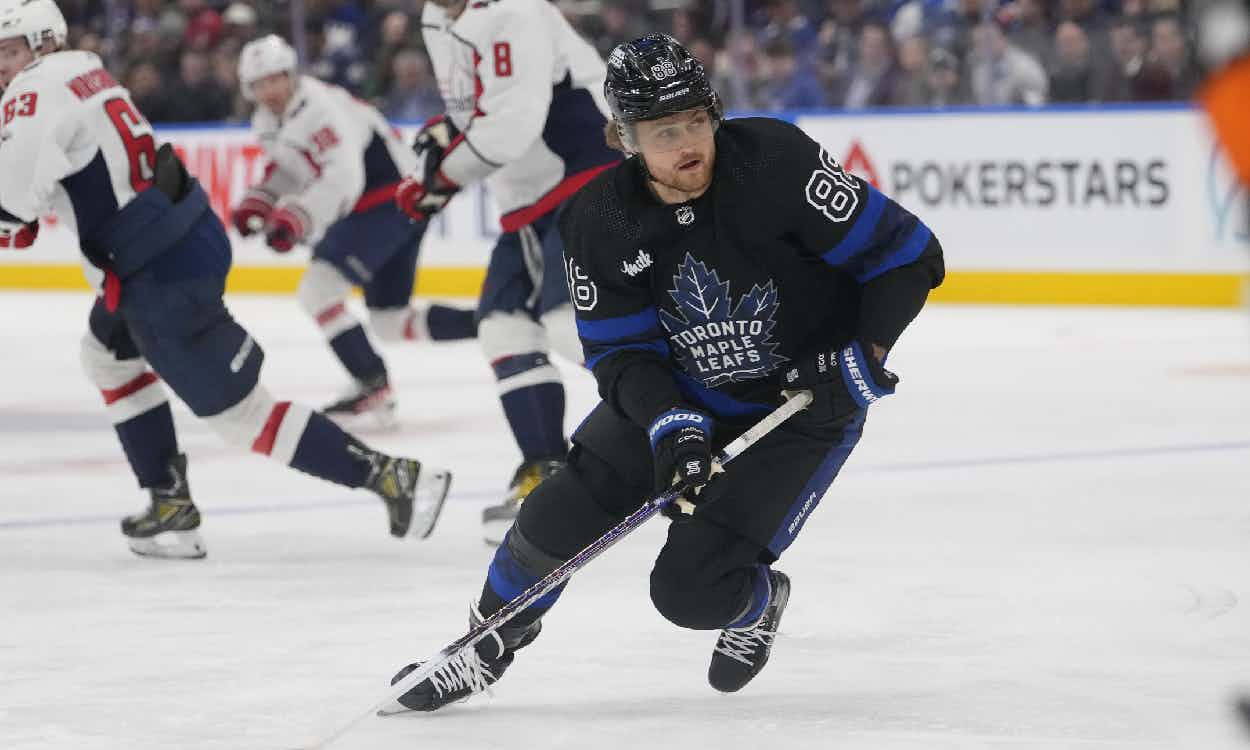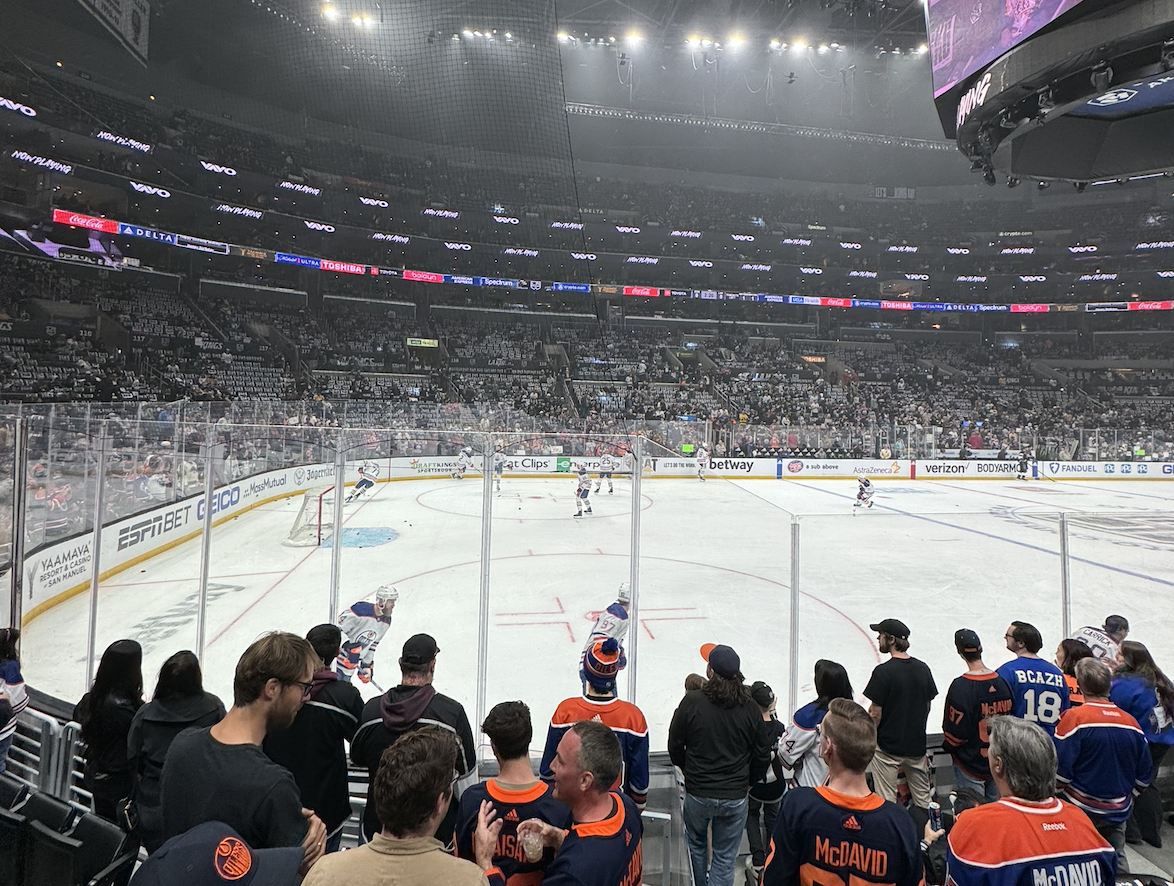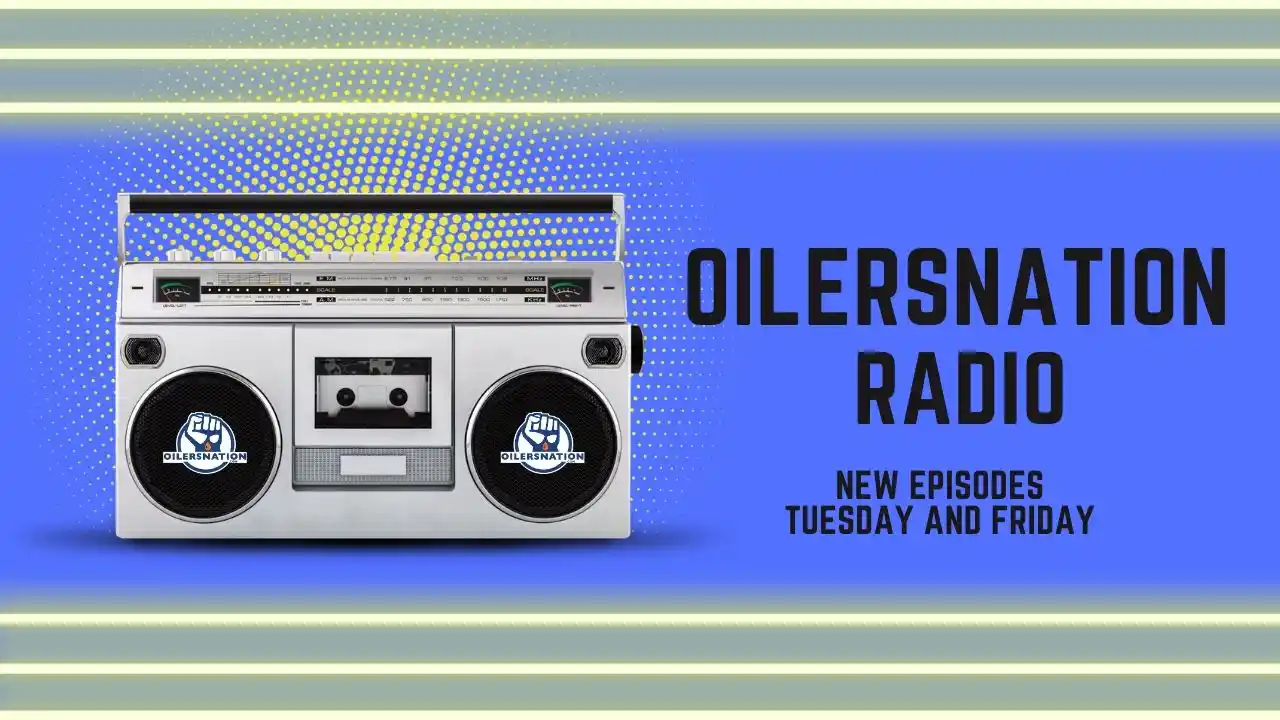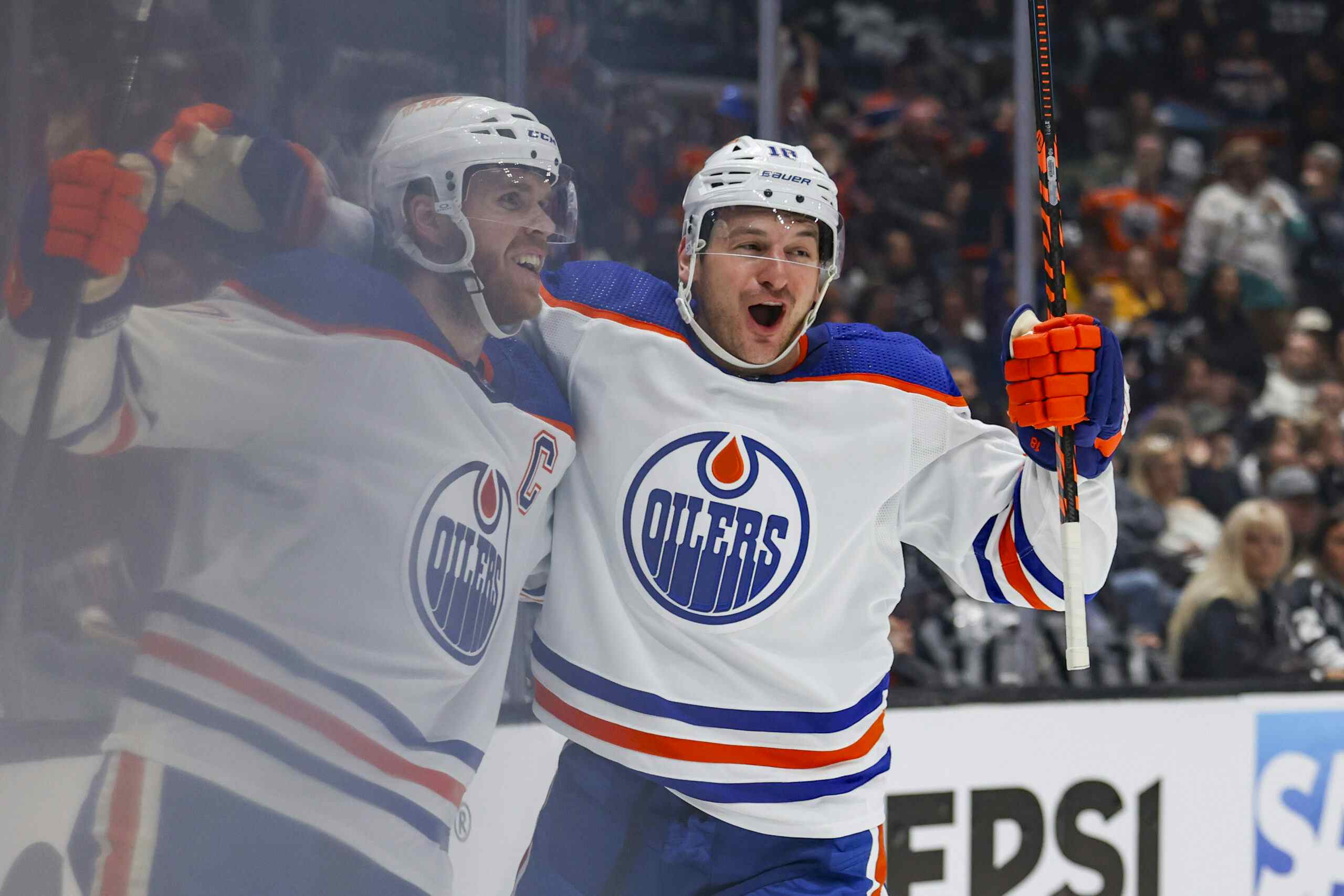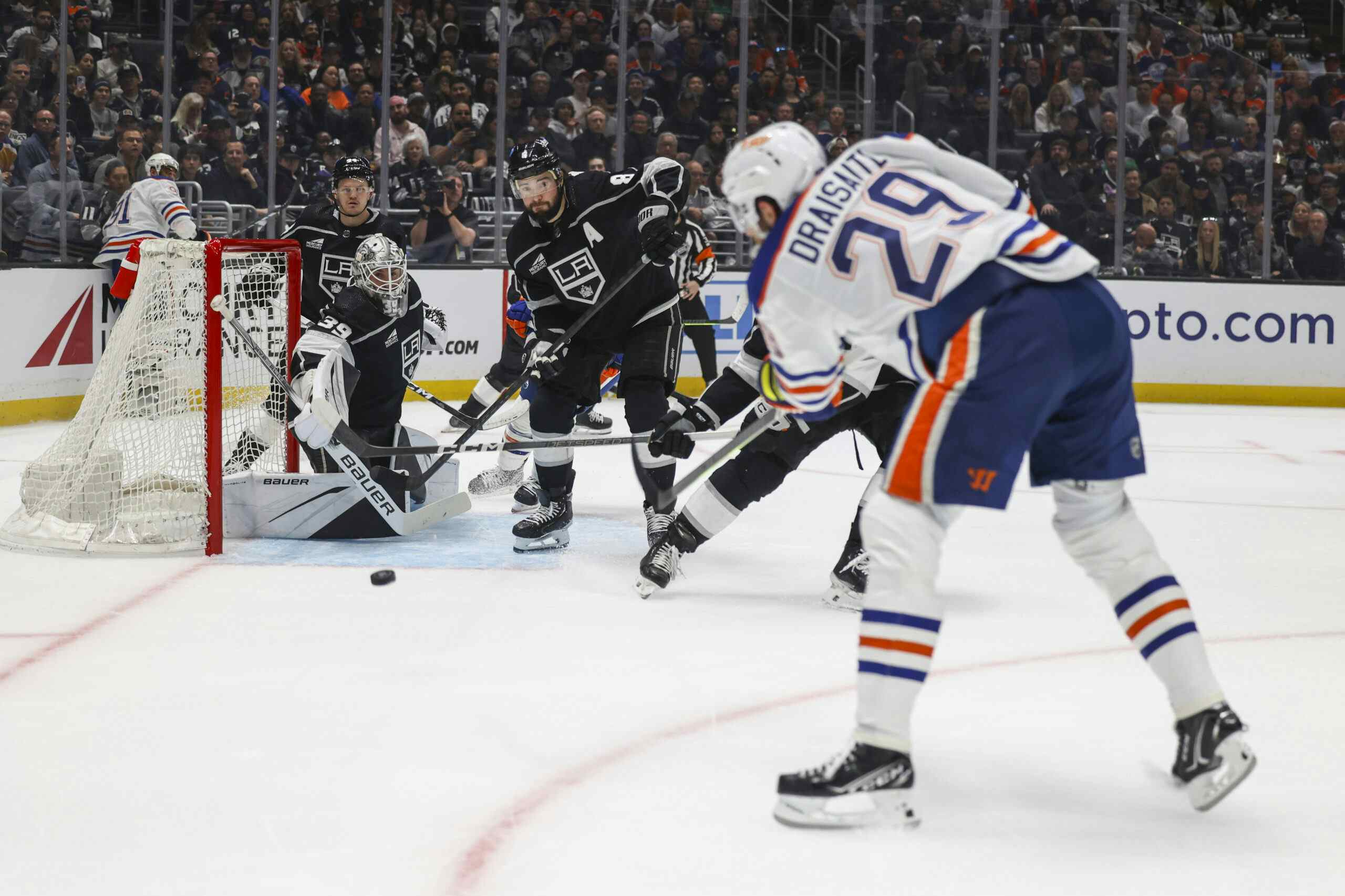The Oilers should strongly consider trading Leon Draisaitl

I don’t expect that the Edmonton Oilers will trade Leon
Draisaitl, but from a financial perspective he is the most logical of the team’s
high-end forwards to send out in a trade for a defenceman.
Draisaitl, but from a financial perspective he is the most logical of the team’s
high-end forwards to send out in a trade for a defenceman.
For any team with a budget or a cap problem, Draisaitl’s
lower paycheck and flexible contract future offer the kind of options that
Taylor Hall, Ryan Nugent-Hopkins and Jordan Eberle never will. That gives him
value in a trade that the other three lack.
lower paycheck and flexible contract future offer the kind of options that
Taylor Hall, Ryan Nugent-Hopkins and Jordan Eberle never will. That gives him
value in a trade that the other three lack.
The Other Team’s Perspective
Next year is going to be an ugly year for cap teams. Larry
Brooks of the New York Post reported
on Sunday that a failure by the NHLPA to trigger its escalator clause would
result in a salary cap fall, with the league’s cap reduced by about $2.0
million. Even with the escalator triggered, there would be only a small
increase, a raise in the ballpark of $1.5 million.
Brooks of the New York Post reported
on Sunday that a failure by the NHLPA to trigger its escalator clause would
result in a salary cap fall, with the league’s cap reduced by about $2.0
million. Even with the escalator triggered, there would be only a small
increase, a raise in the ballpark of $1.5 million.
For lots of teams with cap problems, 2016-17 is going to be
a real issue.
a real issue.
For budget teams, every year features a battle to stay
competitive with an internally imposed salary cap. For those teams—clubs like
Arizona, Anaheim, Ottawa—any chance to cut costs while keeping
comparable talent is welcomed. Oilers fans should be able to relate; this was
what life in Edmonton was like for a very long time, where Bill Guerin turned
into Anson Carter who turned into Radek Dvorak all in the name of shaving some
precious dollars off the payroll.
competitive with an internally imposed salary cap. For those teams—clubs like
Arizona, Anaheim, Ottawa—any chance to cut costs while keeping
comparable talent is welcomed. Oilers fans should be able to relate; this was
what life in Edmonton was like for a very long time, where Bill Guerin turned
into Anson Carter who turned into Radek Dvorak all in the name of shaving some
precious dollars off the payroll.
For a team in either situation, Leon Draisaitl would be
incredibly attractive.
incredibly attractive.
With a base salary next year of just
$925,000 and the possibility of using the bonus cushion as a salary cap
work-around, and with the ability to potentially play a second-line centre role
already, Draisaitl is a fantastic bargain. For Edmonton, with cap space, that’s
nice. For a cap team or a budget team, that kind of financial edge is critical
and well worth paying a premium in terms of real talent.
$925,000 and the possibility of using the bonus cushion as a salary cap
work-around, and with the ability to potentially play a second-line centre role
already, Draisaitl is a fantastic bargain. For Edmonton, with cap space, that’s
nice. For a cap team or a budget team, that kind of financial edge is critical
and well worth paying a premium in terms of real talent.
Additionally, Draisaitl has not yet signed an extension for
when his entry-level deal ends next summer. For the Oilers, a long-term deal is
the obvious play. If they pay a little more in the first four years (when he’s
under team control) they can presumably lock him up for three or even four
years of unrestricted free agency, thereby keeping costs down at that point.
when his entry-level deal ends next summer. For the Oilers, a long-term deal is
the obvious play. If they pay a little more in the first four years (when he’s
under team control) they can presumably lock him up for three or even four
years of unrestricted free agency, thereby keeping costs down at that point.
For a cap or budget team, that lack of extension means that Draisaitl could
be given a bridge deal, which (including the one year left on his ELC) would
mean that he could be a veritable bargain for three full seasons.
be given a bridge deal, which (including the one year left on his ELC) would
mean that he could be a veritable bargain for three full seasons.
For budget teams, three years of cheap production has
incredible value. For cap teams eyeing a Stanley Cup run, ditto. And it’s value
that simply isn’t available in a Hall or Eberle or Nugent-Hopkins.
incredible value. For cap teams eyeing a Stanley Cup run, ditto. And it’s value
that simply isn’t available in a Hall or Eberle or Nugent-Hopkins.
Edmonton’s Perspective

The Oilers, of course, like a deal as much as the next team.
But with deep pockets and some salary cap flexibility, Edmonton isn’t as
financially strained as other NHL teams. More critical for the Oilers is the
need to add the best possible defenceman to their roster before the start of
next season. That’s what makes Draisaitl an interesting point of conversation:
He’s going to have financial value in a trade that the $6 million-men don’t,
and Edmonton should be willing to sacrifice that financial value if it gets the
team a better return.
But with deep pockets and some salary cap flexibility, Edmonton isn’t as
financially strained as other NHL teams. More critical for the Oilers is the
need to add the best possible defenceman to their roster before the start of
next season. That’s what makes Draisaitl an interesting point of conversation:
He’s going to have financial value in a trade that the $6 million-men don’t,
and Edmonton should be willing to sacrifice that financial value if it gets the
team a better return.
From a financial perspective, the Oilers need to start
worrying about the summer of 2018, when Connor McDavid’s entry-level deal
expires. Draisaitl isn’t much help there, because even if the team gives him a
bridge deal two of his three cheap seasons will be burned up by the time
McDavid gets expensive, at which point Draisaitl will presumably need to get
paid. So Draisaitl’s tremendous cap value in the present isn’t going to do the
Oilers much good in the future when the team needs to pay McDavid.
worrying about the summer of 2018, when Connor McDavid’s entry-level deal
expires. Draisaitl isn’t much help there, because even if the team gives him a
bridge deal two of his three cheap seasons will be burned up by the time
McDavid gets expensive, at which point Draisaitl will presumably need to get
paid. So Draisaitl’s tremendous cap value in the present isn’t going to do the
Oilers much good in the future when the team needs to pay McDavid.
Further on the trade value, one of the other items working
in Draisaitl’s favour on the market is something that makes him popular
locally: He hasn’t been stained by losing. The glow of Hall, Eberle and
Nugent-Hopkins has been lost in years of losing, and that may impact their
trade value negatively. Draisaitl doesn’t carry that burden. The funny thing is
that had Draisaitl been in the shoes of any of those players the results would
not have been better: the other three all were better players over their first
two NHL seasons than Draisaitl has been.
in Draisaitl’s favour on the market is something that makes him popular
locally: He hasn’t been stained by losing. The glow of Hall, Eberle and
Nugent-Hopkins has been lost in years of losing, and that may impact their
trade value negatively. Draisaitl doesn’t carry that burden. The funny thing is
that had Draisaitl been in the shoes of any of those players the results would
not have been better: the other three all were better players over their first
two NHL seasons than Draisaitl has been.
Because I don’t believe that losing or winning are
infectious diseases (if they were, Hall would surely have carried his winning virus
over from junior/international play and/or brought his losing virus to Team
Canada) I don’t see much upside to moving out one of the longer-tenured
forwards. Instead, if Draisaitl has more value due to less guilt by
association, that’s a mark in favour of trading him.
infectious diseases (if they were, Hall would surely have carried his winning virus
over from junior/international play and/or brought his losing virus to Team
Canada) I don’t see much upside to moving out one of the longer-tenured
forwards. Instead, if Draisaitl has more value due to less guilt by
association, that’s a mark in favour of trading him.
Trading Draisaitl over one of the other three makes no
difference from an expansion draft viewpoint. Due to Edmonton’s ill-advised
decision to keep Draisaitl on the roster for a big chunk of 2014-15, he needs a
spot on the protected list just as much as the older trio.
difference from an expansion draft viewpoint. Due to Edmonton’s ill-advised
decision to keep Draisaitl on the roster for a big chunk of 2014-15, he needs a
spot on the protected list just as much as the older trio.
It’s also hard to argue that Draisaitl brings more talent to
the equation than someone like Nugent-Hopkins, who had superior scoring numbers
at the same age over his rookie and sophomore seasons. This is particularly
true when we consider Draisaitl’s disastrous rookie campaign or the way he imploded
away from Hall in 2015-16.
the equation than someone like Nugent-Hopkins, who had superior scoring numbers
at the same age over his rookie and sophomore seasons. This is particularly
true when we consider Draisaitl’s disastrous rookie campaign or the way he imploded
away from Hall in 2015-16.
So, to summarize:
- Draisaitl has more financial value to other teams than the
Oilers, increasing his trade value - Draisaitl has less guilt-by-association, increasing his
trade value - Draisaitl’s NHL performance over his first two seasons is
inferior to that of a player like Nugent-Hopkins and certainly Hall, suggesting
his ceiling is lower - There is no expansion draft benefit to keeping Draisaitl
over another forward
Put it all together and Edmonton could plausibly move a
lesser player for a greater return this summer if it’s willing to entertain
trading Draisaitl. I believe the club should strongly consider it. Having said
that, I don’t believe the team will seriously debate moving Draisaitl.
lesser player for a greater return this summer if it’s willing to entertain
trading Draisaitl. I believe the club should strongly consider it. Having said
that, I don’t believe the team will seriously debate moving Draisaitl.
Why? Because Draisaitl weighs 215 pounds. Hall, Eberle and
Nugent-Hopkins don’t.
Nugent-Hopkins don’t.
Update: Fellow Oilers writer Bruce McCurdy contacted me to point out that Draisaitl is a bit of a unique case in that he actually should have five years of team control after his ELC expires. That suggests Edmonton might opt for a bridge deal itself, and which also means there could potentially be another year of overlap between Draisaitl’s second contract and McDavid’s second contract. That does increase the Oilers’ financial motivation to hang on to the player, and weakens the argument to trade him.
Recent articles from Jonathan Willis

